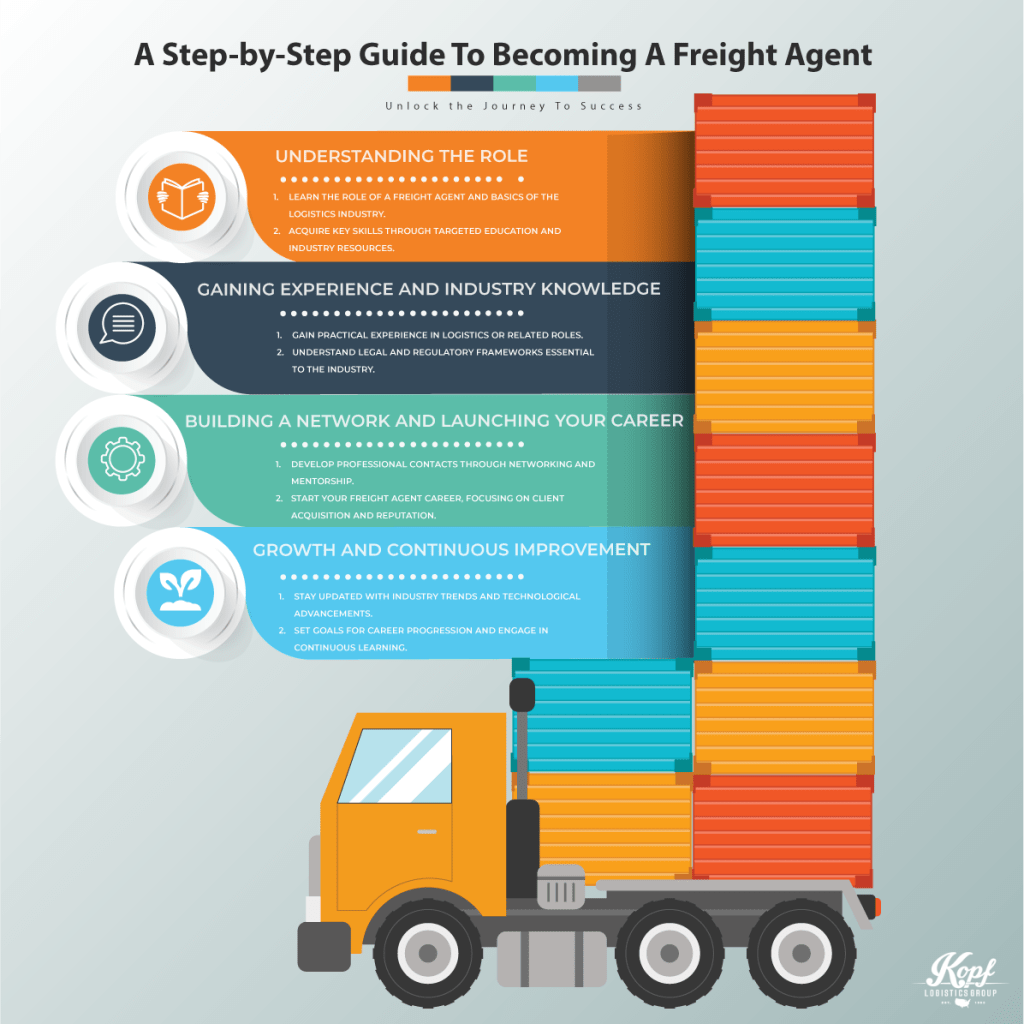In the bustling world of logistics and transportation, the role of a freight agent stands out as both dynamic and crucial. As someone eyeing a spot in this vibrant sector, understanding what it takes to become a successful freight agent is the first step to launching a rewarding career.
What is a Freight Agent?
What exactly is a freight agent? Simply put, a Freight Agent is an independent contractor who coordinates the transportation of goods for shippers. They arrange the pickup, transit, and delivery of cargo by negotiating with carriers. Their work involves managing logistics details, ensuring timely delivery, and maintaining communication with both shippers and carriers. This role is essential in the shipping industry as they directly manage the operational aspects of freight movement. This independent contractor is the linchpin in connecting shippers with carriers, ensuring that each cargo reaches its destination smoothly.
In differentiating freight agents vs. freight brokers, it’s essential to know that while both play integral roles in logistics, their responsibilities and scopes differ. Freight brokers are more involved in the legal and financial aspects of shipping, whereas freight agents focus on the operational side, working under a freight broker or a parent freight company.
Your Path to Become a Freight Agent
Embarking on a career as a freight agent doesn’t require a specific degree, but certain skills are non-negotiable. Excellent communication, time management (4 Tips To Help Freight Agents Stay Organized), and an applicable skill set in logistics are fundamental. Your journey begins with identifying a reputable freight broker or a parent company to partner with. This association provides you with the necessary support system to work with shippers and carriers (Tips For Freight Agents Looking To Secure A Contract Carrier) and tips for managing your own business.
Understanding the Freight Broker’s Role in Your Success as an Agent
One key element to a successful career as a freight agent is understanding the role of the freight broker you’ll be collaborating with. Understanding the distinct roles of freight brokers and agents is key to your success in the logistics industry. By recognizing that freight brokers, who are licensed through the Federal Motor Carrier Safety Administration (FMCSA) and legally responsible for the cargo, handle many of the regulatory and liability aspects, you as a freight agent can focus more effectively on the customer service and sales side of the business. This knowledge empowers you to develop the right skills and strategies for your role and fosters a more productive collaboration with freight brokers. Ultimately, this leads to a more efficient workflow, better client relationships, and potentially, a more successful career in freight logistics.
How Much Can Freight Agents Make
How do freight agents make their earnings, and how much can freight agents earn? Primarily, it’s through the margin they maintain between what they charge their customers (the shippers) and what they pay the carriers. This commission-based structure means your earning potential is directly tied to how much business you generate. With the right determination, the sky’s the limit.
What Kind of Work Do Freight Agents Do
Freight agents work in a fast-paced environment, and their day-to-day tasks can vary greatly. From securing a customer base and negotiating rates with carriers to ensuring timely delivery of the client’s freight, the role requires a keen eye for detail and the ability to multitask effectively. Freight agents oversee the entire shipping process, offering clients peace of mind by ensuring their cargo is in good hands. This aspect of the job is not only about managing logistics but also about building trust and relationships with both shippers and carriers.
Freight Agent vs. Dispatcher: Knowing the Difference
It’s crucial to distinguish between a freight agent and a dispatcher. While both are key players in the transportation industry, a freight agent typically works with shippers, facilitating the shipping process. In contrast, dispatchers are more focused on working with carriers and managing the logistical aspects of transportation. In essence, a Freight Agent connects shippers and carriers to move freight.
A Closer Look at Freight Agency Work Life
In the heart of logistics, freight agency work involves meticulous coordination and management of various moving parts. Agencies serve as the intermediaries between shippers and carriers, ensuring that each step of the transportation process is executed flawlessly. An efficient freight agency is characterized by its ability to:
1) Manage complex logistics
2) Maintain excellent customer relations (Customer Satisfaction: Tips For Freight Agents)
3) Manage the administrative tasks that come with shipping and receiving goods.
Building a Successful Career as a Freight Agent
To thrive as an independent freight agent, cultivating a robust customer base and forging existing relationships within the industry is vital. Aligning with an established freight broker or a parent freight company offers numerous advantages, from leveraging its reputation to benefiting from its infrastructure, like cargo insurance and load boards. This partnership allows you to focus on what you do best – being the crucial link between shippers and carriers.
Career Opportunities in the Freight Agent Field
The demand for skilled freight agents is on the rise, with the projected job growth rate for freight brokers and agents at a steady 5% from 2018-2028. This growth is a clear indicator of the vibrant opportunities that lie ahead in this field. Staying abreast of the latest trends, especially the integration of technology in logistics, is key to staying competitive.
The Critical Role and Advancement Opportunities of Freight Agents
Being a freight agent is not just a job; it’s a career with significant growth potential. Agents play a crucial role in the logistics industry, and their expertise is highly valued. This field offers numerous advancement opportunities, from developing into senior roles within an agency to starting your own brokerage firm. With extensive experience, a freight agent can navigate the complexities of the transportation industry and carve a niche in this dynamic field.
Setting the Course for Your Freight Agent Journey
The role of a freight agent is as challenging as it is rewarding. With the right skill set, a robust network, and a keen understanding of the industry, you can carve out a successful career in this field. If you’re looking to become an independent agent or partner with an established freight broker or parent company like Kopf Logistics Group, the opportunities for growth and success are ample, and we would love to speak with you. If you found this article helpful, tell us in the comments section below.
More Info On Freight Agent Work Life
Ever wondered what a day in the life of a freight agent is really like? Get the inside scoop on their daily challenges and top tips for success. Check out these must-read articles to dive deeper:
- 4 Common Challenges for Freight Agents
- Can a Truck Dispatcher Be a Freight Agent?
- Is Being A Freight Agent Is A Stressful Job?
Frequently Asked Questions About Freight Agents
- What does a cargo freight agent do?
- Primarily, they expedite and manage the movement of cargo and freight, ensuring efficient and timely delivery.
- Are freight agents in demand?
- Absolutely, with the industry growing steadily, the need for skilled freight agents continues to rise.
- How many freight agents are there in the US?
- As of 2023, there are approximately 2,412 freight agents in the United States1.



In January, I made the decision to dissolve my trucking company. Now, I’m interested in becoming a freight agent for Kolf Logistics. Could you please provide me with more information regarding any required training and how to begin? I eagerly anticipate speaking with a representative at your earliest convenience.
Hi Timothy! Jeanie would love to talk with you. Please give her a call at five seven four – three four nine – five six zero zero.
I have 5 owner operators. I am looking for a home. I would like to grow to 15 trucks. My customer base is Jbhunt, Schneider and Ryder. I am billing over 2 million a year.
Hi Larry! Please apply here: kopflogisticsgroup.com/agent